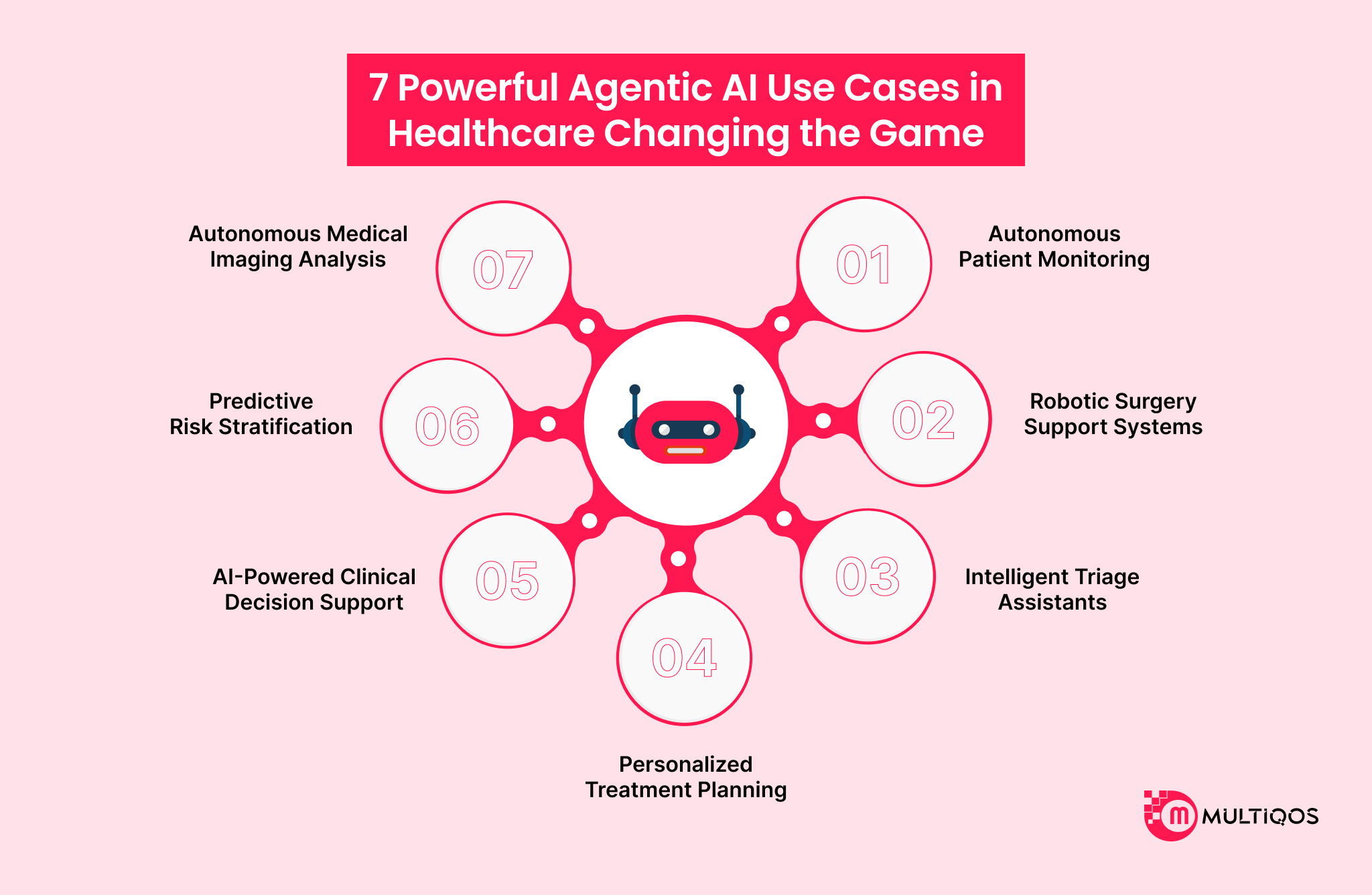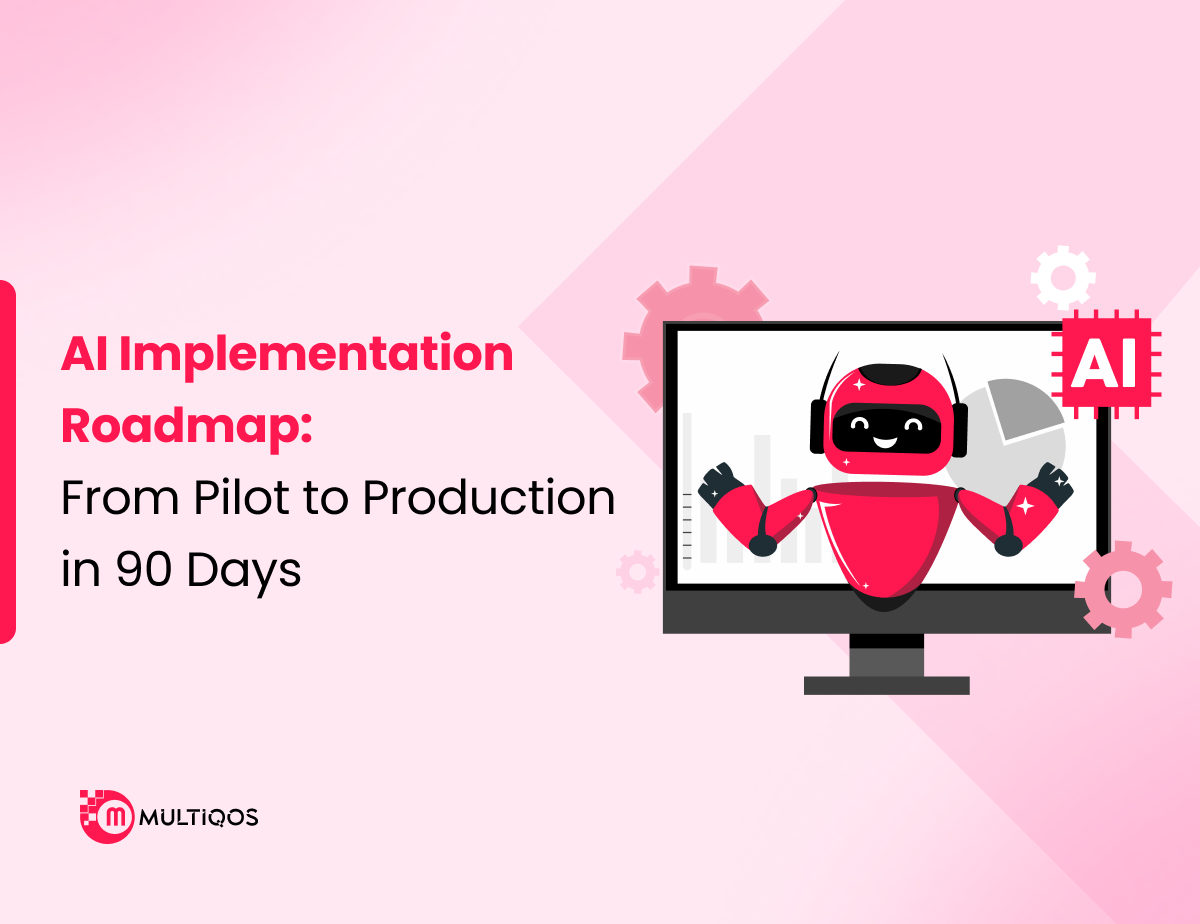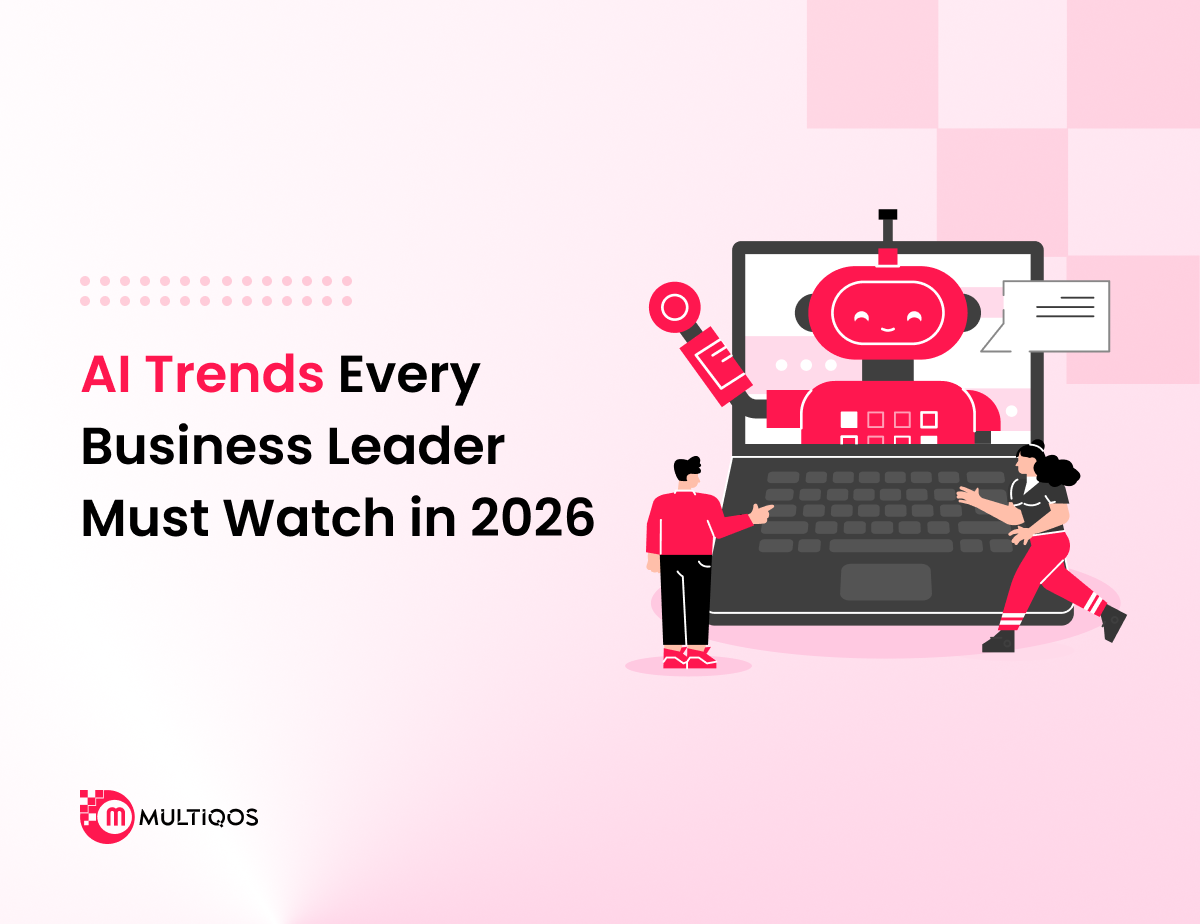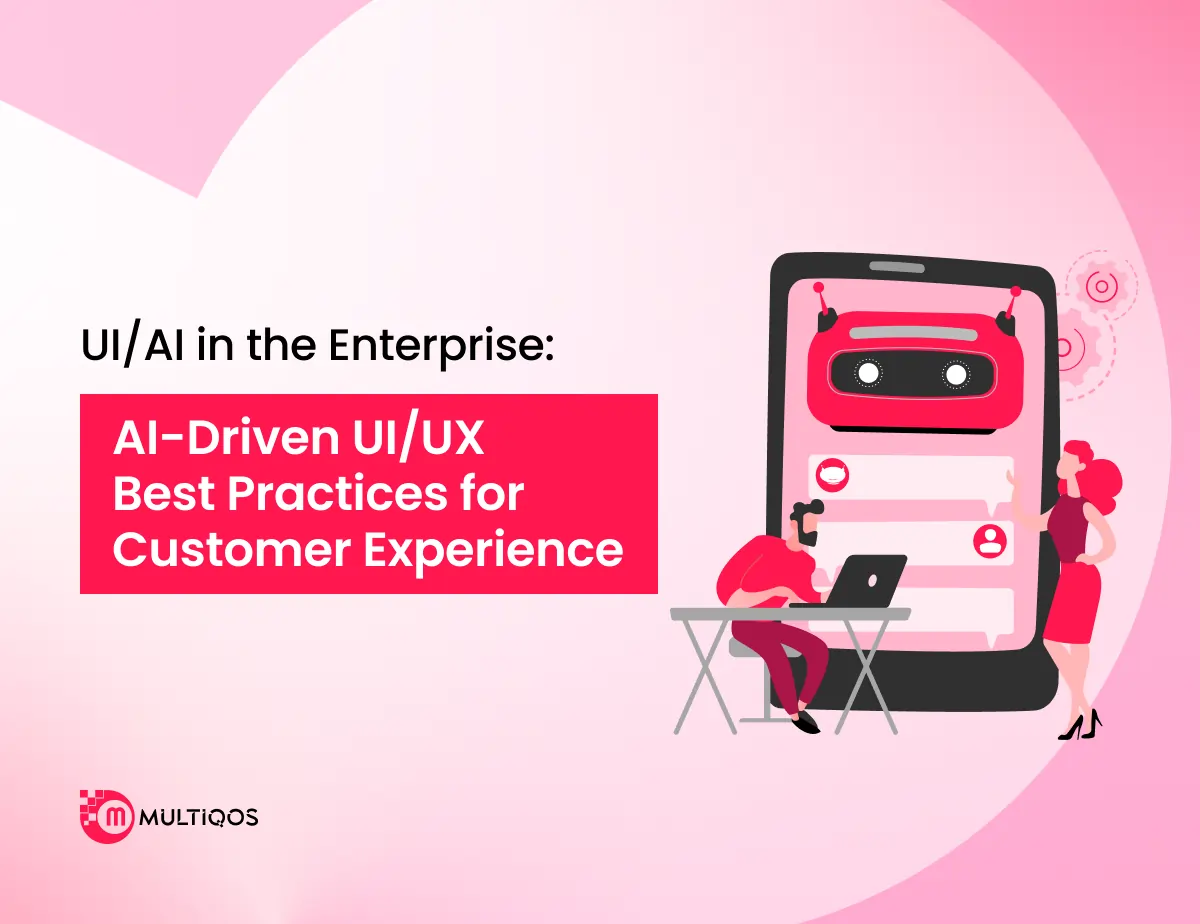Top 7 Agentic AI Use Cases in Healthcare You Should Know

Summary :
Agentic AI is rapidly transforming the healthcare landscape by enabling intelligent systems that can make decisions, take actions autonomously, and adapt in real-time. This blog explores the top 7 agentic AI use cases in healthcare, from personalized treatment planning and automated diagnostics to virtual health assistants and predictive analytics.
You’ll learn how agentic AI enhances efficiency, reduces human error, and supports clinicians in delivering better, faster care. Whether you’re a healthcare professional, tech innovator, or policymaker, this guide offers key insights into the most impactful and emerging applications of agentic AI in medicine.
Introduction
Healthcare is shifting in ways we haven’t seen before, and much of that momentum is being shaped by a new class of intelligent systems. These aren’t the rule-based tools we’ve used for years. Instead, they’re built to observe, adapt, and act—often without waiting for direct input. When patient data changes, these systems can respond right then and there, cutting down on delays and reducing pressure on staff.
That kind of quick thinking makes a difference. It can take some of the load off busy teams, help catch problems earlier, and even make treatment feel more personal—without adding extra work.
In this blog, we discover the top 7 Agentic AI use cases in healthcare that are already making waves and transforming how care is delivered. Whether you are a healthcare professional, a technical innovator, or just curious about the future of medicine, these groundbreaking examples will show you what is possible when it comes to Agentic AI in healthcare.
7 Powerful Agentic AI Use Cases in Healthcare Changing the Game
1. Autonomous Patient Monitoring
Autonomous patient monitoring is a prominent example of Agentic AI use cases in healthcare services, where AI systems continuously track significant signals and health status in real time. These Agentic AI development services can immediately notify significant changes and autonomously to the medical staff or adjust treatment units without waiting for human input.
This capacity improves patient safety by ensuring timely intervention, reducing human errors, and freeing health professionals to focus on more complex care needs.
2. Robotic Surgery Support Systems
One of the most advanced Agentic AI use cases in healthcare is the integration of AI-powered robots into surgical processes. These systems support surgeons by making real-time, autonomous adjustments based on sensor data and imaging feedback, improving accuracy during operation and reducing the risk.
Unlike traditional robotic devices, Agentic AI can actively interpret intraoperative data and optimize movements with minimal human input. It reduces surgical consequences, low recovery time, and minor complications in the future of surgical care.
3. Intelligent Triage Assistants
One of the most important Agentic AI use cases in healthcare is the distribution of intelligent triage assistants. These chatbots and kiosks talk to patients, ask about their symptoms, and find out how important their condition is.
They then help people guide people in the right place – whether it is an emergency room, immediate care, or a regular doctor’s visit. By taking this job, they reduce waiting time and reduce the pressure on health professionals. In this way, patients are careful not to need them quickly, and everything is going smoother.
4. Personalized Treatment Planning
A prominent example of Agentic AI use cases in healthcare is a personalized treatment strategy. Agentic AI adapts treatment protocols by evaluating the ongoing test results, responds in real-time to therapy, and enables care plans aligned with the patient. These systems learn from patient data continuously and adjust the recommendations accordingly, ensuring that care remains relevant and responsible.
5. AI-Powered Clinical Decision Support
AI-powered clinical decision support is among the leading Agentic AI use cases in healthcare. These smart systems see many up-to-date patients’ information as they can suggest their medical history, test results, and scan and treatment plans on their own or even begin without waiting for them to approve anyone.
By automatically preserving some clinical and treatment steps, they help doctors avoid delay and make better decisions. The integration of autonomous AI development services not only leads to better patient results but also helps the health teams work smoothly, especially when things get busy.
6. Predictive Risk Stratification
Agentic AI estimates patients at high risk of conditions such as sepsis or heart failure, and automatically triggers early interventions to prevent complications. This active approach allows doctors to prioritize care and distribute resources more efficiently, making it one of the most valuable Agentic AI use cases in healthcare to improve patient outcomes.
7. Autonomous Medical Imaging Analysis
AI systems interpret medical scans independently, recognize deviations quickly, and support faster diagnosis, which leads to more accurate diagnoses. By reducing the dependence on manual review and accelerating diagnostic workflows, it is an important means of Agentic AI use cases in healthcare for radiology and diagnostic departments.
Conclusion
The emergence of Agentic AI is not just a technological upgrade; it is a paradigm shift in how healthcare development services are distributed, managed, and experienced. From future diagnosis to autonomous care coordination, Agentic AI use cases in healthcare that we discovered are the beginning of very major changes.
Since these intelligent systems become more advanced, healthcare organizations will not only require visionary management but also the right technical expertise to bring these innovations to life. If you want to use intelligent, action-oriented AI solutions, it is now time to hire AI developers who understand the complexity and capabilities of the Agentic AI.
FAQs
It’s a type of system that doesn’t just sit back and wait. In a hospital, for example, it might track a patient’s condition and step in when needed — maybe by notifying staff or adjusting a setting. It’s not just following orders; it’s built to act on its own when something changes. That ability to respond, not just observe, is what sets it apart.
With most traditional tools, you still need someone to review the output and decide what to do. These systems might suggest something or highlight a result, but the action part is still up to the doctor. Agentic systems don’t work that way. They can do something about what they detect — for instance, adjusting a patient’s treatment or alerting a nurse right away without even asking for it.
Some leading Agentic AI use cases in healthcare include:
- AI-powered virtual health assistants
- Autonomous patient monitoring
- Personalized treatment planning
- Robotic surgical support
- Smart triage systems
- Predictive analytics for chronic disease management
- AI-led diagnostics and imaging analysis
- Intelligent hospital workflow automation
- Adaptive mental health chatbots
- AI-based drug discovery platforms
Hospitals are very busy and under pressure these days. Doctors and nurses have a lot on their plates, and when the patient’s condition suddenly changes, a little delay can also be severe. Agnetic AI is a system that monitors changes immediately and reacts – without waiting for someone to notice, and also supports medical staff by helping them in handling things that can easily slip through the cracks during a busy day.
Get In Touch







